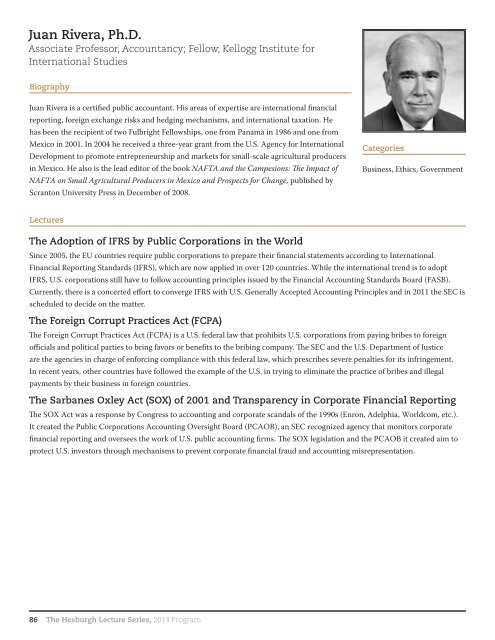HESBURGH LECTURE SERIES 2013 Program - Alumni Association ...
HESBURGH LECTURE SERIES 2013 Program - Alumni Association ...
HESBURGH LECTURE SERIES 2013 Program - Alumni Association ...
You also want an ePaper? Increase the reach of your titles
YUMPU automatically turns print PDFs into web optimized ePapers that Google loves.
Juan Rivera, Ph.D.<br />
Associate Professor, Accountancy; Fellow, Kellogg Institute for<br />
International Studies<br />
Biography<br />
Juan Rivera is a certified public accountant. His areas of expertise are international financial<br />
reporting, foreign exchange risks and hedging mechanisms, and international taxation. He<br />
has been the recipient of two Fulbright Fellowships, one from Panama in 1986 and one from<br />
Mexico in 2001. In 2004 he received a three-year grant from the U.S. Agency for International<br />
Development to promote entrepreneurship and markets for small-scale agricultural producers<br />
in Mexico. He also is the lead editor of the book NAFTA and the Campesions: The Impact of<br />
NAFTA on Small Agricultural Producers in Mexico and Prospects for Change, published by<br />
Scranton University Press in December of 2008.<br />
Lectures<br />
The Adoption of IFRS by Public Corporations in the World<br />
Since 2005, the EU countries require public corporations to prepare their financial statements according to International<br />
Financial Reporting Standards (IFRS), which are now applied in over 120 countries. While the international trend is to adopt<br />
IFRS, U.S. corporations still have to follow accounting principles issued by the Financial Accounting Standards Board (FASB).<br />
Currently, there is a concerted effort to converge IFRS with U.S. Generally Accepted Accounting Principles and in 2011 the SEC is<br />
scheduled to decide on the matter.<br />
The Foreign Corrupt Practices Act (FCPA)<br />
The Foreign Corrupt Practices Act (FCPA) is a U.S. federal law that prohibits U.S. corporations from paying bribes to foreign<br />
officials and political parties to bring favors or benefits to the bribing company. The SEC and the U.S. Department of Justice<br />
are the agencies in charge of enforcing compliance with this federal law, which prescribes severe penalties for its infringement.<br />
In recent years, other countries have followed the example of the U.S. in trying to eliminate the practice of bribes and illegal<br />
payments by their business in foreign countries.<br />
The Sarbanes Oxley Act (SOX) of 2001 and Transparency in Corporate Financial Reporting<br />
The SOX Act was a response by Congress to accounting and corporate scandals of the 1990s (Enron, Adelphia, Worldcom, etc.).<br />
It created the Public Corporations Accounting Oversight Board (PCAOB), an SEC recognized agency that monitors corporate<br />
financial reporting and oversees the work of U.S. public accounting firms. The SOX legislation and the PCAOB it created aim to<br />
protect U.S. investors through mechanisms to prevent corporate financial fraud and accounting misrepresentation.<br />
86 The Hesburgh Lecture Series, <strong>2013</strong> <strong>Program</strong><br />
Categories<br />
Business, Ethics, Government



